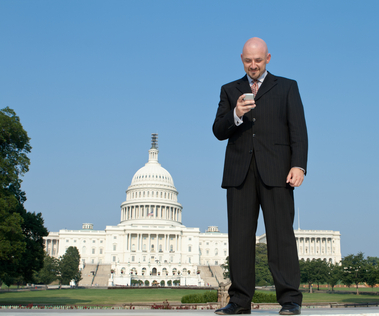
Winning political campaigns today, from the Statehouse to Congress, are those that fully embrace technology. Smartphones especially have become an important means for raising campaign money, recruiting volunteers, and encouraging voter turnout. These devices allow political campaigns to easily, quickly and affordably reach a targeted audience. With that in mind, trends in mobile technology will certainly play a role in shaping the 2014 and 2016 elections.
Mobile Technology Wins the Vote
While old-fashioned outreach efforts like telemarketing, direct mail, door-to-door canvassing, and television advertising remain essential, today's political campaigns are augmenting traditional marketing with mobile technology. SMS messaging, voice broadcast, and interactive voice response are just some of the strategies political campaign managers use to reach constituents on mobile devices. Political campaigns also capitalize on the trend toward using smartphones to access social media and the internet; thus, mobile technology is shaping election outcomes in ways the internet alone cannot. What’s more, because of the multimedia capabilities of mobile phones, an increasing number of campaign trackers are using their phones to capture information that could influence voter decisions.
SMS Text Messaging
Because almost 100% of texts are opened, most within an hour of their receipt, political campaign managers have been using SMS to connect with constituents in a timely manner and thus win votes. Short codes make it easy for voters and supporters to opt in to receive bulk campaign messages. Gauging from the mobile trend, SMS will most likely be used for the following purposes in the 2014 and 2016 elections:
- Informing voters of campaign news/events
- Ensuring maximum turnout at rallies/appearances
- Increasing volunteering/fundraising
- Sending election day reminders
- Collecting donations through text-to-donate campaigns
- Conducting polls
Interactive Voice Response
Campaigns do not have limitless budgets or an endless supply of volunteers to answer and make phone calls. Therefore, political telephone marketing increasingly means incorporating efficient means of interacting with constituents via new technologies. Interactive voice response (IVR), for example, has been used in the following ways:
- Routing incoming campaign office calls to appropriate parties
- Quickly and efficiently engaging the community through updates, surveys, and donation opportunities
- Gathering and disseminating appropriate information
Voice Broadcast
Campaign managers also see the tremendous benefit of using voice broadcast, which allows automated messages to be sent to many mobile devices simultaneously. Here are just a few ways voice broadcast continues to be used in political campaigns:
- Requesting donations/support
- Sending constituents key information
- Integrating IVR to invite call recipients to engage in surveys
Social Media and the Mobile Web
A technology-savvy political campaign recognizes that today's voters are multi-taskers, often moving back and forth between watching T.V. and using their phones, where they may be browsing the web and checking email and social media. That's why campaign workers in 2014 and 2016 will likely capitalize on the following mobile campaign trends:
- Running synchronized T.V./online video advertisements
- Creating mobile web ads targeted to recipients based on location, age, party affiliation, etc.
- Using Facebook and Twitter to increase word-of-mouth support
Finally, it isn't just voters, donors, and volunteers who use their mobile phones for virtually everything today. Campaign trackers are now infamous for using mobile devices to film election-altering videos when researching opposing candidates, and the 2014 and 2016 elections are unlikely to be any exception.
In 2014 and 2016, voters and potential campaign donors will continue to rely on their smartphones to stay informed, whether through the mobile web or through voice and text messages from political candidates. That's why savvy campaign managers will be using a variety of mobile and new technology strategies to draw in constituents and get out the vote.